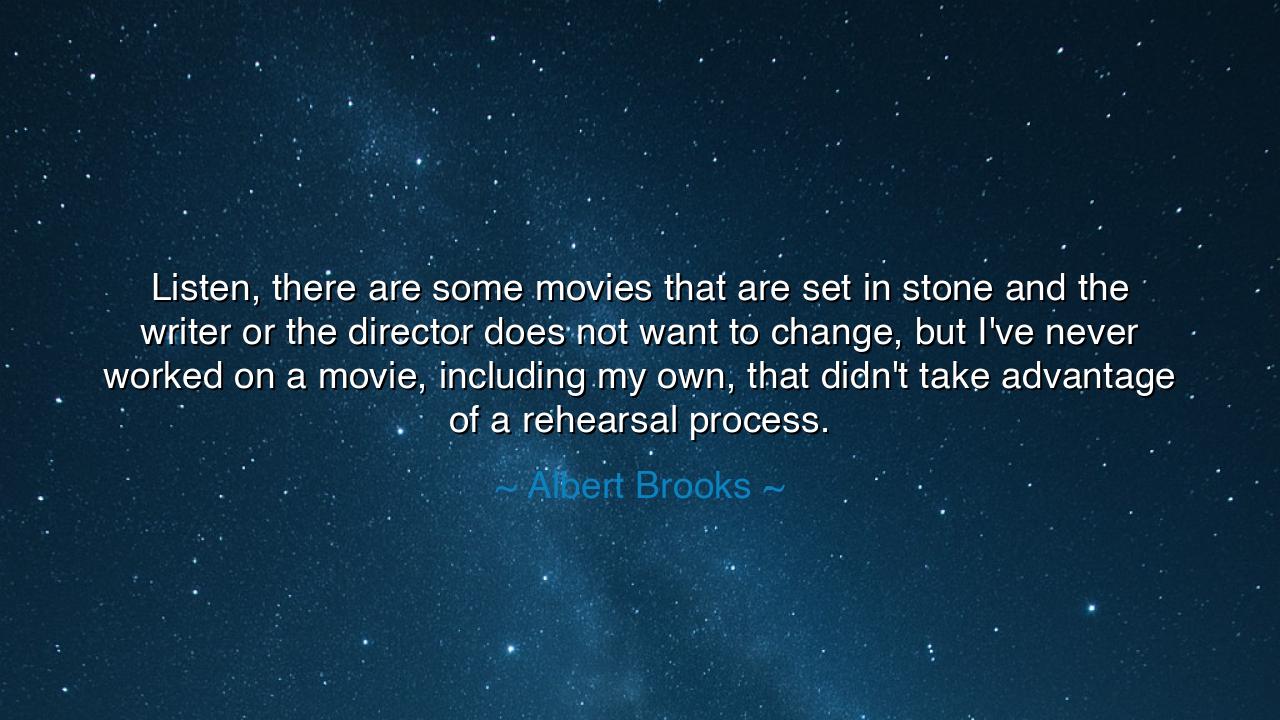
Listen, there are some movies that are set in stone and the
Listen, there are some movies that are set in stone and the writer or the director does not want to change, but I've never worked on a movie, including my own, that didn't take advantage of a rehearsal process.






Listen, O seekers of wisdom, to the words of Albert Brooks, who speaks with the understanding of one who has walked the path of both creator and collaborator: “Listen, there are some movies that are set in stone and the writer or the director does not want to change, but I’ve never worked on a movie, including my own, that didn’t take advantage of a rehearsal process.” These words are not just about the art of filmmaking, but about the very essence of creation, of the willingness to adapt, to refine, and to perfect. Even the most established works, those that seem fixed and unchangeable, benefit from the fluidity of process—the process of constant improvement through collaboration.
In the ancient world, the most revered works of art, whether epic poetry, sculpture, or architecture, were never static. The Greeks and Romans understood that to create something truly great required the interaction between the artist and their craft. Phidias, the great sculptor, did not simply carve statues in isolation; he collaborated with his fellow craftsmen, constantly refining and adjusting his work. Even the great Homer, whose epic poems were passed down through generations, engaged in a process of oral rehearsal, repeating and adjusting his verses before they were committed to memory. The act of creation, in all its forms, was never about a singular moment of inspiration but about the constant revision, rehearsal, and improvement that came with time and practice.
Consider the great builders of the pyramids in Egypt. The architects and engineers, though guided by the vision of the Pharaoh, did not simply set their designs in stone without testing them. The rehearsal process for them was the trial and error of adjusting their techniques, of learning from each stone that was placed and each angle that was measured. They, too, understood that the act of building was a living process, one that required constant attention, adjustment, and reflection. Brooks’ insight into the rehearsal process is a reflection of this ancient wisdom—that creation is never perfect in its first iteration, but must be honed and refined through effort and collaboration.
Think of the great Shakespeare, whose plays were not immediately set in stone upon the first performance, but went through numerous rehearsals and iterations. Actors would bring their own interpretations to the roles, and the script would evolve as it was performed. Shakespeare was no stranger to the fact that even the finest words required the process of refining, tweaking, and perfecting. Just as Brooks speaks of the movie that can always be improved through rehearsals, Shakespeare’s works too were an ongoing dialogue between the script, the actors, and the audience. The process of rehearsal was not merely a prelude to the performance—it was part of the act of creation itself.
There is a profound lesson in Brooks’ words for us all. In life, as in art, there is no such thing as a perfect first draft. Whether it is in our work, relationships, or personal growth, the rehearsal process is essential. We must give ourselves the space to refine our actions, our ideas, and our goals. Just as a director would never allow a movie to be filmed without first rehearsing its scenes, we too must prepare ourselves for the challenges ahead by practicing, adjusting, and improving. Brooks’ experience teaches us that collaboration and iteration are the keys to truly bringing something into existence—something that not only lives but thrives.
Thus, O seekers, take heed of the wisdom passed down by Albert Brooks and the ancient artists who understood the importance of the rehearsal process. In all things, do not rush toward a final outcome without first giving yourself the opportunity to reflect, to practice, and to improve. Just as Phidias and Shakespeare sought constant refinement, so too must we be willing to revisit our work, our relationships, and ourselves. In creation, there is always room for growth. Let rehearsal become not just a step, but a way of life—a continuous process of shaping, refining, and perfecting. By doing so, we create works that are alive, vibrant, and full of the wisdom earned through effort and reflection.
In your own lives, O future generations, let the process of rehearsal guide you. Whether it is in learning a new skill, building a new relationship, or pursuing your dreams, do not fear the process of trial and error. For it is through practice, adjustment, and collaboration that we come closest to our true potential. Like the great creators of old and Albert Brooks, embrace the idea that your best work is not found in a single moment but in the ongoing dance of revision and refinement. Only then can you bring forth something that is truly worthy of the world’s attention, and of your own heart’s approval.






AAdministratorAdministrator
Welcome, honored guests. Please leave a comment, we will respond soon